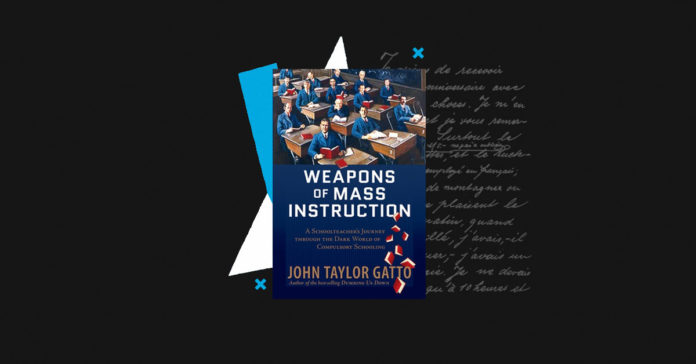John Taylor Gatto’s Weapons of Mass Instruction, focuses on mechanisms of traditional education which cripple imagination, discourage critical thinking, and create a false view of learning as a byproduct of rote-memorization drills.
Gatto demonstrates that the harm school inflicts is rational and deliberate. The real function of pedagogy, he argues, is to render the common population manageable. To that end, young people must be conditioned to rely upon experts, to remain divided from natural alliances and to accept disconnections from their own lived experiences. They must at all costs be discouraged from developing self-reliance and independence.
Escaping this trap requires a strategy Gatto calls “open source learning” which imposes no artificial divisions between learning and life. Through this alternative approach our children can avoid being indoctrinated-only then can they achieve self-knowledge, good judgment, and courage.
My favorite excerpts:
- …and at the turn of the twentieth century most Americans considered it both unnatural and unwise to buy things they didn’t actually need. Mandatory schooling was a godsend on that count. School didn’t have to train kids in any direct sense to think they should consume nonstop, because it did something even better: it encouraged them not to think at all. And that left them sitting ducks for another great invention of the modern era – marketing. (p.xx)
- It’s perfectly obvious from our society today what those specifications were. Maturity has by now been banished from nearly every aspect of our lives. Easy divorce laws have removed the need to work at relationships; easy credit has removed the need for fiscal self-control; easy entertainment has removed the need to learn to entertain one-self; easy answers have removed the need to ask questions. We have become a nation of children, happy to surrender our judgments and our wills to political exhortations and commercial blandishments that would insult actual adults. We buy televisions, and then we buy the things we see on the television. We buy $150 sneakers whether we need them or not, and when they fall apart too soon we buy another pair. We drive SUVs and believe the lie that they constitute a kind of life insurance, even when were upside-down in them. And, worst of all, we don’t bat an eye when Ari Fleischer tells us to “be careful what you say,” even if we remember having been told somewhere back in school that America is the land of the free. We simply buy that one, too. Our schooling, as intended, has seen to it. (p. xxi-xxii)
- Now for the good news. Once you understand the logic behind modern schooling, its tricks and traps are fairly easy to avoid. School trains children to be employees and consumers; teach your own to be leaders and adventurers. School trains children to obey reflexively; teach your own to think critically and independently. Well-schooled kids have a low threshold for boredom; help your own to develop an inner life so that they’ll never be bored. Urge them to take on the serious material, the grown-up material, in history, literature, philosophy, music, art, economics, theology – all the stuff schoolteachers know well enough to avoid. Challenge your kids with plenty of solitude so that they can learn to enjoy their own company, to conduct inner dialogues. Well-schooled people are conditioned to dread being alone; they seek constant companionship through the TV, the computer, the cell phone, and through shallow friendships quickly acquired, quickly abandoned. Your children should have a more important life, and they can. (p. xxii)
- Any political management, even tyranny, must provide enough work for ordinary people that revolutionary conditions don’t emerge. Forced schooling provides a spectacular jobs project, one almost infinitely elastic, one expanding and contracting with employment needs. (p. 22)
- Under this outlook, the classroom would never be used to produce knowledge, but only to consume it; it would not encourage the confined to produce ideas, only to consume the ideas of others. The ultimate goal implanted in student minds, which replaced the earlier goal of independent livelihoods, was getting a good job. (p. 25)
- An independent mind is the worst danger of all, but twelve years spent in a school chair (and now in front of a computer terminal or television, etc.), will convert the most crowded inner life into a virtually blank slate. (p. 42)
- The United States is now only nominally a free market economy; corporate welfare is dominant, the enormous American military has not, for a very long time, been primarily about protecting common American citizens from harm. It exists for several never-discussed reasons: to provide employment for the underclasses; to avoid uprisings at home; to act as a centrifuge in distributing wealth through contracts back to the managers of the system and their allies; and it exists, in the gravest extreme to “go domestic”.. (p. 43)
- School had to train in consumption habits: listening to others, moving on a bell or horn signal without questioning, becoming impressionable – more accurately, gullible – in order to do well on tests. Kids who insisted on producing their own lives had to be humiliated publicly as a warning to others. (p. 44)
- Education (not schooling) teaches what really matters, that adding value to others is the only way to add value to yourself. If you aren’t useful you must be useless – and nobody wants that. (p. 52)
- The most reckless failure of our modern American nation is how we waste people in the interest of keeping systems efficient. Systems won’t protect us in the time of the swear bath we’ve entered; systems can’t heal the diseased economy which systems-thinkers have built – only sovereign human spirits intact can do that, the kind which can’t be fashioned in factory schools. (p. 52)
- We used to make steel, now we make bubbles – with the strangest economic bubble of them all being the swollen and cancerous school bubble, early childhood to graduate college, a utopian growth which costs much more than any dividends it yields. It breaks families, intellects, characters. It visits incompetence on tens of millions. It’s a black hole of negative energy draining vitality from national life. Just losing the young from the everyday world had pernicious effects, cumulative ones. We lost our libertarian momentum in the wall-to-wall conformity well regulated corporate life demands; we lost our unity, our cohesion, in the face of the many divisions and disconnections confinement schooling requires. (p. 52)
- Separate schooling and education into compartments, and useful distinctions jump out at you: schooling is a matter of habit and attitude training. It takes place from the outside in. Education is a matter of self-mastery, first; then self-enlargement, even self-transcendence – as all possibilities of the human spirit open themselves into zones for exploration and understanding. There are points where the two conditions inform one another, but in schooling, somebody else’s agenda is always uppermost. This mind control aspect is what makes it so unpleasant, even pornographic to some, although not to the lost souls already broken to the game of pleasing others. You can easily compensate for a lack of schooling – the human record is full of stories of those who have done so in the past and those who continue to do so in the present – but without education you will stumble through life, a sitting duck for exploitation and failure, no matter how much money you make. (p. 61)
- It’s quite rare for an inventive person in any field to trace success to school training. Education must be largely self-initiated, a tapestry woven out of broad experience, constant introspection, ability to concentrate on one’s purpose in spite of distractions, a combination of curiosity, patience, and intense watchfulness, and it requires substantial trial and error risk-taking, along with a considerable ability to take feedback from the environment – to learn from mistakes. (p. 62)
- I’m tempted to say forever. Growth and self-mastery are reserved for those who vigorously self-direct, like Stanley: planning, doing, creating, reflecting, freely associating, taking chances, punching the lights out on your tormentors. But this is precisely the agenda school is set up to prevent. (p. 64)
- Government schooling is the most radical adventure in history. It kills the family by monopolizing the best times of childhood and by teaching disrespect for home and parents. (p. 84)
- In thirty years of teaching kids, rich and poor, I almost never met a learning-disabled child; hardly ever met a gifted-and-talented one, either. Like all school categories, these are sacred myths created by human imagination. They derive from questionable values that we never examine because they preserve the temple of schooling. (p. 85)
- Ordinary people send their children to school to get smart, but what modern schooling teaches is dumbness. Old-fashioned dumbness used to be simple ignorance. Now it’s been transformed into permanent mathematical categories of relative stupidity, such as “gifted and talented, “mainstream, and “special ed” – categories in which learning is rationed for the good of the system and the social order. Dumb people are no longer merely ignorant. Now they are dangerous imbeciles whose minds must be conditioned with substantial doses of commercially prepared disinformation for tranquilizing purposes. (p. 86)
- The new dumbness is particularly deadly to middle- and upper-middle-class kids already made shallow by the pressures to conform imposed by the world on their often lightly rooted parents. When these kids come of age, they feel certain they must know something, because their degrees and licenses say they do. They remain convinced of this until an unexpectedly brutal divorce, a corporate downsizing. or panic attacks brought on by meaninglessness manage to upset the precarious balance of their incomplete adult lives. Alan Bullock, the English historian, said evil is a state of incompetence. If he’s right, then our school adventure filled the twentieth century with evil. (p. 86)
- As a schoolteacher I found that the kids who drove me crazy were always big TV watchers. Their behavioral profile wasn’t pretty. TV addicted kids were irresponsible, childish, dishonest, malicious to one another; above all else they seemed to lack any sustaining purpose of their own, as if by consuming too many made-up stories, modeling themselves after too many men and women who were pretending to be somebody else, listening to too many talking hamburgers and too many explanations of the way things are (sponsored by oil companies and dairy councils) they had lost the power to behave with integrity – to grow up. (p. 91)
- The Advent Of Schoolrooms And Electronic Screens
- That’s not to say education doesn’t matter. It does. You need finely tuned critical judgement to defend yourself in the dangerous house of mirrors America has become. It’s just that college won’t give you education. Only you can do that. (p. 161)









